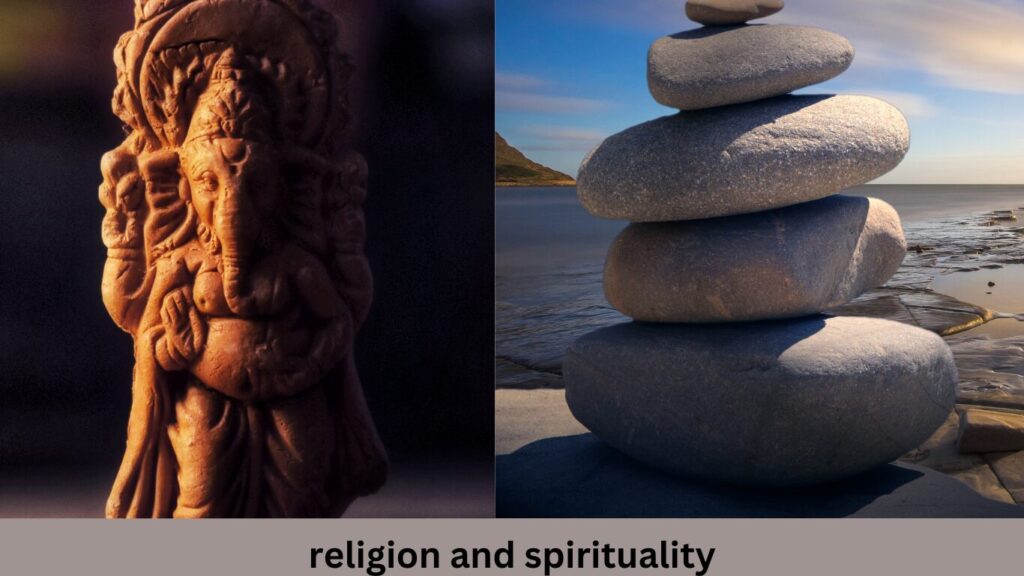Understanding the Fundamental Difference
In our quest for existential understanding and meaning, we often encounter the terms religion and spirituality. While they are sometimes used interchangeably, they represent distinct concepts with unique implications for individuals and society.
Defining Religion
Religion typically refers to organized systems of beliefs, practices, and rituals centred around a deity or deities. These systems often have established institutions, clergy, and doctrines that dictate the beliefs and behaviours of adherents. Examples of major religions include Christianity, Islam, Hinduism, Buddhism, and Judaism.
Unpacking Spirituality
On the other hand, spirituality encompasses a broader, more personal approach to seeking meaning and connection with something greater than oneself. It often involves exploring questions of existence, purpose, and transcendence outside the framework of organized religion. Spirituality can manifest in various forms, including meditation, mindfulness, nature appreciation, and personal reflection.
Key Differences Between Religion and Spirituality

Authority and Structure
One of the primary distinctions between religion and spirituality lies in their levels of authority and structure. Religion typically operates within established hierarchies, with religious leaders interpreting sacred texts and prescribing rituals and moral guidelines for followers. In contrast, spirituality is more decentralized and individualistic, with practitioners often relying on personal experiences, intuition, and introspection to guide their beliefs and practices.
Beliefs and Dogma
Religion tends to adhere to specific sets of beliefs and dogma that are codified in sacred texts or traditions. Adherents are expected to accept these beliefs as fundamental truths and adhere to prescribed rituals and moral codes. Spirituality, on the other hand, is characterized by greater flexibility and openness to diverse perspectives. Practitioners may draw inspiration from various spiritual traditions, philosophical teachings, or personal insights, without necessarily adhering to rigid dogma.
Rituals and Practices
Religion often involves elaborate rituals, ceremonies, and communal worship practices that serve to reinforce collective identity and foster a sense of belonging among adherents. These rituals may include prayers, sacraments, pilgrimages, and religious festivals. Spirituality, while not devoid of rituals, tends to emphasise more personal and introspective practices aimed at cultivating inner peace, mindfulness, and spiritual growth. Activities such as meditation, yoga, journaling, and nature walks are common expressions of spiritual practice.
Finding Common Ground

While religion and spirituality represent distinct approaches to the search for meaning and transcendence, they are not necessarily mutually exclusive. Many individuals find themselves navigating a complex interplay between religious traditions and personal spiritual experiences. Some may find solace and community within the structure of organized religion, while others may prefer the autonomy and flexibility of a spiritual path.
Integration and Synthesis
In recent years, there has been a growing recognition of the need for dialogue and synthesis between religious and spiritual perspectives. Scholars, theologians, and spiritual leaders are increasingly exploring ways to integrate the wisdom of various traditions while honouring the diverse experiences and beliefs of individuals. This inclusive approach acknowledges that spirituality is a deeply personal journey that can intersect with religious practice but also transcends it.
Benefits of Religion and Spirituality
Psychological Benefits
Research suggests that both religion and spirituality can promote psychological well-being by offering comfort, hope, and a sense of belonging. Practices like prayer and meditation have been linked to reduced stress and increased resilience.
Emotional Benefits
Engagement in religious or spiritual practices can enhance emotional resilience, foster gratitude, and provide coping mechanisms during challenging times. Belief systems often offer solace and guidance in navigating life’s uncertainties.
Social Benefits
Religious communities provide social support networks, fostering connections and a sense of belonging. Shared values and rituals promote cohesion and solidarity among members, contributing to overall societal harmony.
Conclusion: Embracing Diversity in the Search for Meaning
In summary, the distinction between religion and spirituality lies in their approaches to authority, beliefs, practices, and community. While religion offers structure, tradition, and communal support, spirituality provides autonomy, flexibility, and personal exploration. Both paths offer valuable insights and opportunities for growth on the journey toward understanding the mysteries of existence.
As we navigate the complexities of modern life, embracing diversity and respecting the myriad ways in which individuals seek meaning and connection is essential. Whether through organized religion, personal spirituality, or a combination of both, the human quest for transcendence remains a timeless and universal endeavour.





One Comment